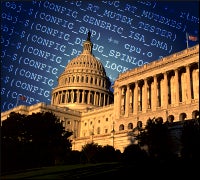 |
Is open source good for America? A group of over 70 leading open source vendors thinks so, and they’ve now formed an effort to lobby Washington and to promote open source for government use.
The Open Source for America coalition is made up of over 50 member groups including Red Hat, Linux Foundation, Oracle, Sun, Novell, Google, AMD, Mozilla and other key open source vendors.
The new group comes at a critical time for the U.S. government as stimulus funds begin to flow and as the new administration aims to open up the government to become more transparent. Open Source for America isn’t specifically targeting stimulus funding, but it is aiming to make open source an issue and a key principle for how the U.S. government uses IT.
“A number of us representing companies, organization and academic institutions thought that the time was right to put together an organization that could be a voice for open source in Washington,” Tom Rabon, executive vice president of corporate affairs at Red Hat (NYSE: RHT), told InternetNews.com. “Historically, companies like mine that are involved in open source all had individual agendas, but there was never one organization that tried to put all the open source community under one tent to Washington and say we’re the voice of open source — and that’s what we’re trying to do.”
Rabon added that with the new Obama administration, there has been a call for more open and transparent government, and open source is a technology approach that fits that bill.
“The mood in Washington is one that is demanding transparency in government,” Jim Zemlin, executive director of the Linux Foundation and a member of the group’s board of advisors. “Open source is a transparent form of creating technology and fits in well with the new mood in Washington.”
In Zemlin’s view, open source in the federal government today is underutilized and he sees a real opportunity for wider adoption. He added that one of the goals of Open Source for America is to make sure the government understands that open source technology can help IT to save money, meet the technology needs and be part of a transparent solution for government.
The wider participation model that is the hallmark of open source development is a key principle that will also ensure better security as well as technology, according to Rabon.
“In the open source world, we believe that nobody is as smart as everybody,” Rabon said. “To the extent that we can tap into the collective wisdom of people in the software world and come up with solutions which address some of the government’s problems, we all stand to gain, including the government.”
Open source stimulus funds?
The timing of the announcement of the group is not necessarily directly related to current U.S. stimulus funding efforts, Rabon added.
“The was no effort to create this group because of stimulus funds,” Rabon said. “Quite frankly, we’re probably better off if the economy is such that people ask serious questions about the way they spend the government’s money. When they do, we have a better chance of winning than when the world is flush with money.”
In particular, Rabon said he sees open source as having a role to play in other areas — like health care reform.
The effort is about more than just pushing Linux in the U.S. government, though — that’s one of the reasons why it was set up as working group of the Linux Foundation.
Despite its participation in Open Source for America, the Foundation’s Zemlin said that his group aimed to participate in rather than lead the effort.
“Where an effort like this is housed is less relevant than the broad coalition that you can bring together,” Zemlin said.


